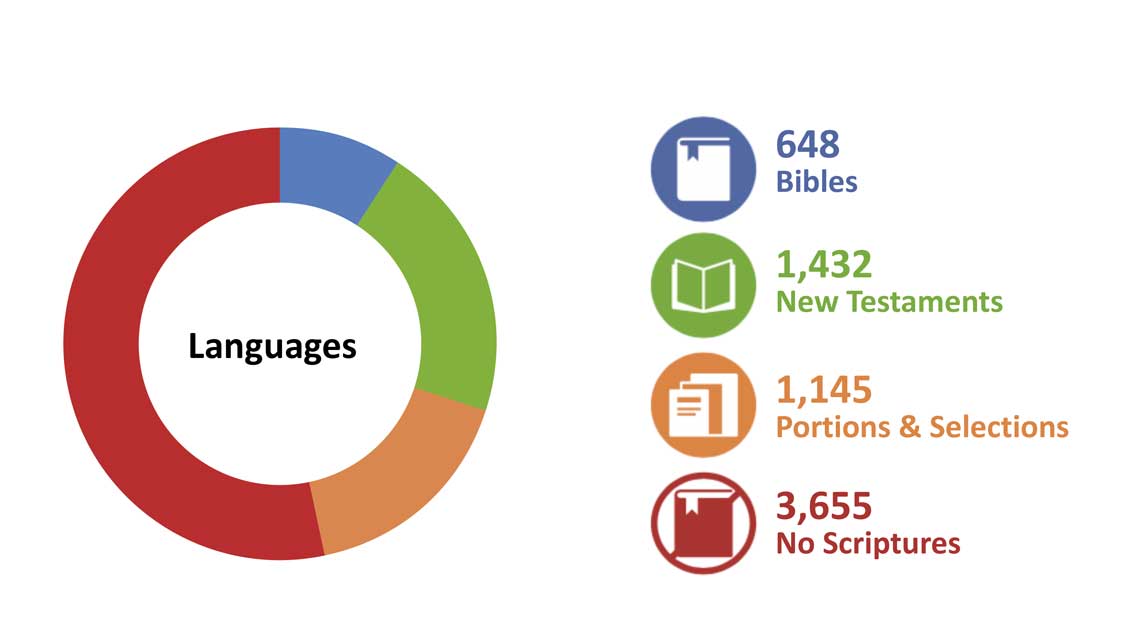Wycliffe maintains a cool statistics page at…
www.wycliffe.net/en/statistics
As you read through the stats on that page, are they encouraging to you or sobering? Do they dare you to take part or do they overwhelm you? For example, over 2000 languages still need a translation. However, over 1500 (1548) translations of the New Testament are already complete! There are 3969 languages with no scripture whatsoever — but those languages only comprise 252 million inhabitants. In other words, the languages that still remain are indeed smaller groups, for the most part. Either way — want to help change things for those who can’t read all about it yet? Try visiting …
The page is super well done. Bravo to the alliance!












I’ve always wondered how many people groups are not connected to at least one trade language?
For example in Nigeria there are three trade languages- Hausa, Ibo, and Youraba. How many tribal groups do not have access to any of these three trade languages? Any that do know one of these along with their tribal language do have access to the Bible.
I feel when we report statistics we need to acknowledge this stat which I have never seen.
A very helpful consideration. Hopefully a Brigada reader linked to Wycliffe can answer us on this matter.
Most likely, almost all have the Scriptures in a trade language. Ideally they would also have it in their heart language. To illustrate this, I once had a supervisor who was Vietnamese. She was very thick-skinned, but one thing really got to her heart–when she heard her brother and sister-in-law arguing in Vietnamese.
In sum, the trade languages are covered, but the heart languages are not. That’s why Bible translation is far from finished.
Having “access to the Bible” in a trade language is not the same thing as understanding the Bible.
We are doing Bible translation in my husband’s first language, spoken in southern Mexico by about 13,000 people. Most people speak some Spanish but the majority would not be considered bilingual. This is true of many of the pastors, too; few, if any, have been to seminary or Bible school. The people have access to Bibles in Spanish; the version favored among most evangelicals is the Reina-Valera (equivalent to the KJV).
If you put all those facts together, you can see that simply being “connected to at least one trade language” does not guarantee good understanding of the Bible.*
Rather, it is similar to a mono-lingual English speaker who studied a foreign language in high school for four years and then using a Bible in that language as their only access to God’s Word. (And let’s not even require it to be written in an old version of the language like the KJV.) How would you do under those circumstances?
*One quick example: We did a small Bible dictionary with the entry words (baptism, synagogue, glory, etc.) in Spanish and the explanation in my husband’s language. When he would give a copy to a pastor, he would show them how it works by opening to a random page and reading an entry. Once he happened to choose “circumcision” and, while the explanation is not graphic, it does get the idea across. The pastor looked intently at my husband and said, “Do people *really* do that?!”
I would also like you to consider your question from an indigenous person’s point of view. How would it feel to be told, “Here’s a majority language Bible; there is not Bible in your language.”?
When Cameron Townsend was trying to sell Spanish Bibles in Guatemala, a man who spoke Kaqchikel asked him, “If your God is so great, why doesn’t He speak my language?”
Many indigenous people in the Americas (and probably around the world) have been told for generations that their languages are actually “dialects,” a word that carries a lot of negative connotations (What you speak is not a real language, it has no grammar, it can’t be written down, it and you are inferior, etc.). Church is done in the majority language, schooling is in the majority language, government–even local government–is in the majority language. So, “of course” God would naturally prefer the majority language; obviously our local language isn’t good enough for Him.
When a minority language person goes into a Christian bookstore and sees lots of Bible in the majority language, lots of versions, lots of options in bindings and presentations but there is literally NOTHING in his own language, what does that say to him? Does God really want him to understand His Word?
Did you ever notice how, in Acts 2, the disciples spoke in other languages–it wasn’t that suddenly the crowd could understand the disciples speaking in Aramaic? God wants people to understand His Word in the language they understand the best. (Also consider how those who believed that day were able to take the Good News home with them in their own languages; they didn’t have to figure out how to translate it.)
Again I remind you that “having access to a Bible” is not the same as “understanding God’s Word” nor does it necessarily tell a minority language speaker that God loves him.